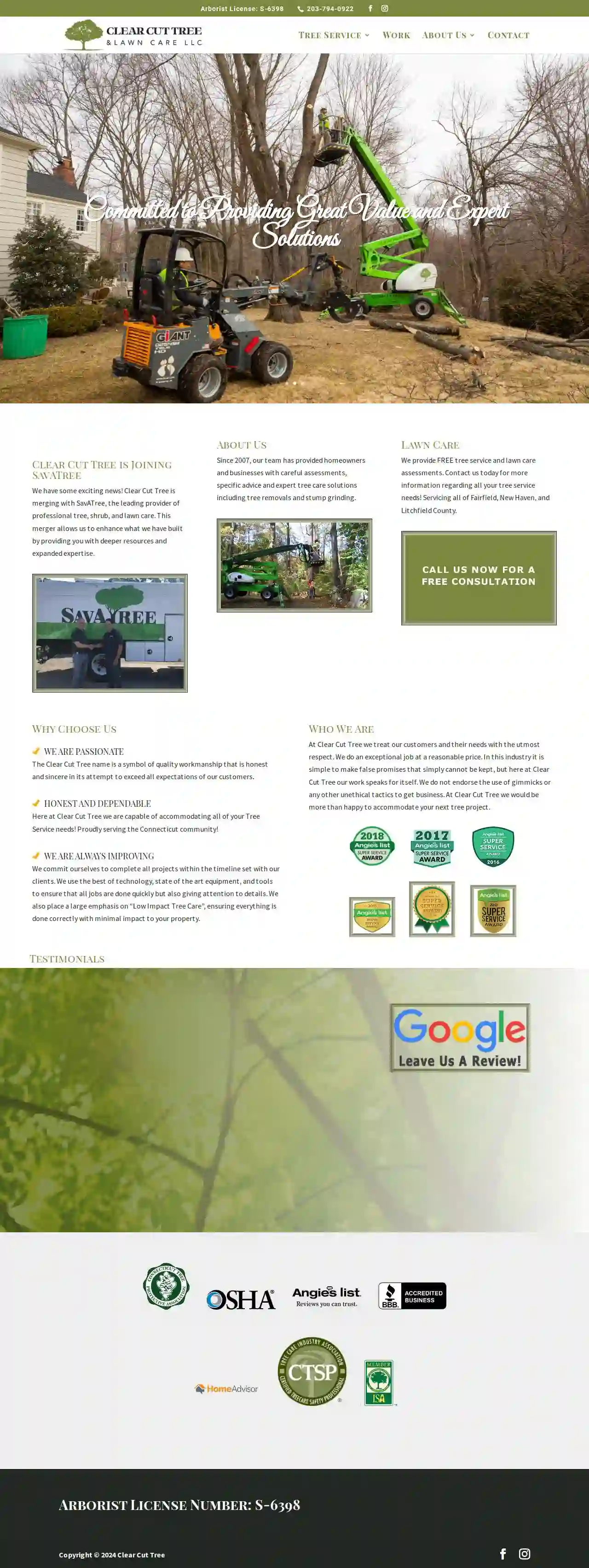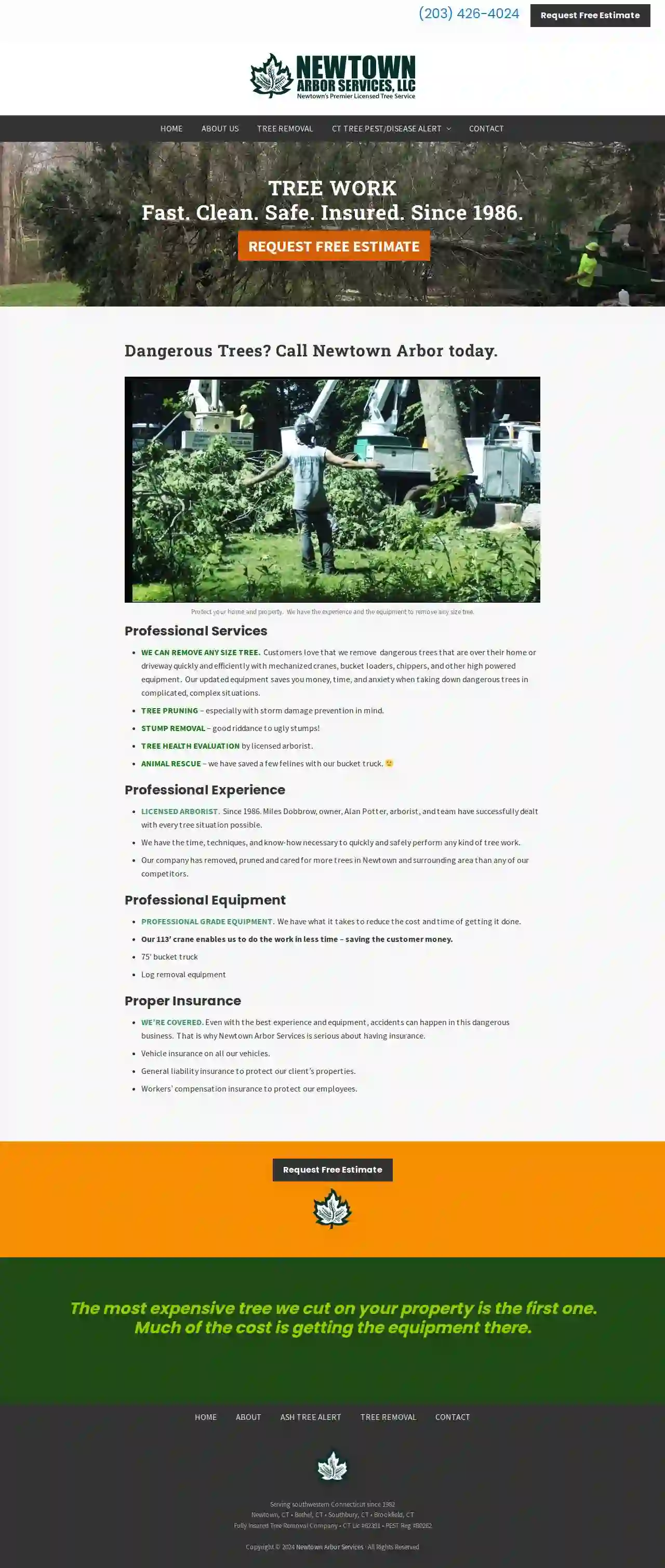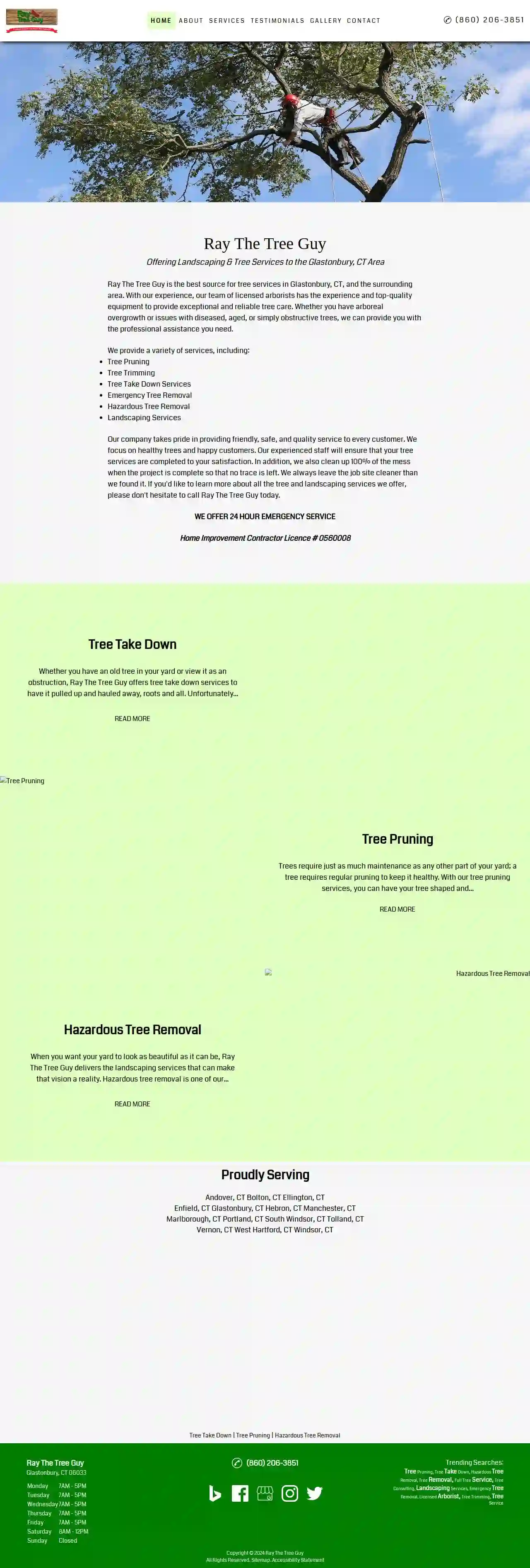Tree Service Brookfield
Top 10 Tree Care Company in Brookfield
Get up to 3 Tree Care quotes for your project today! Compare profiles, reviews, accreditations, portfolio, etc... and choose the best deal.

TOMORROW'S TREES, LLC
4.9106 reviewsOakdale, CT, 467 Chesterfield Road, 06370, USTomorrow's Trees is a top-rated tree care company in Southeastern CT, offering a range of services including tree removal, tree trimming, tree planting, and stump grinding. With over 20 years of experience in the tree industry, they are committed to providing spectacular service at competitive prices. Their crew leaders have extensive experience, and they have a certified arborist on staff to handle all tree care needs.
- Services
- Why Us?
- Testimonials
- Gallery
Get Quote
Clear Cut Tree and Lawn Care LLC
4.715 reviews123 Main St, Milford, 06492, USClear Cut Tree is a professional tree care service provider that offers a wide range of services including tree removal, stump grinding, tree pruning, tree cabling, land clearing, and 24-hour storm clean up. They have been in business since 2007 and are committed to providing great value and expert solutions to their customers. Their team is passionate, honest, and dependable, and they use the best technology and equipment to ensure that all jobs are done efficiently and with minimal impact to the property.
- Services
- Why Us?
- Accreditations
- Our Team
- Testimonials
- Gallery
Get Quote
Jims Tree Service
555 reviewsMonroe, CT, 06468, USJim's Tree Service LLC has been providing quality tree services in the Fairfield County area for over 40 years. Our professionals will safely remove the trees from your property to enhance your landscape, allow more sunlight in your yard, and prevent damage to your property from the dead and diseased trees.
- Services
- Why Us?
- Accreditations
- Our Team
- Testimonials
- Gallery
Get Quote
Black Birch Tree Service and Landscaping
4.421 reviewsSouthbury, CT, 06488, USBlack Birch Tree and Landscape is a fully licensed and insured service provider that offers reliable and affordable tree removal, pruning, storm cleanup, as well as complete landscaping services. With us you will experience timely and efficient service regardless of the job at hand. Our goal is to provide exceptional service and most importantly we will respond to any inquiry within 4 hours. We understand the frustration homeowners experience in getting contractors to return calls in a timely manner. We will effectively communicate with you from estimate to job completion. Our goal is to treat everyone's property we serve as our own! Veteran owned and operated.
- Services
- Why Us?
- Gallery
Get Quote
Trout Brook Arborists
4.9169 reviews69 Talcott Rd, West Hartford, CT, 06110, USTrout Brook Arborists is a leading landscape and tree service provider in West Hartford, Connecticut. Our team of certified arborists offers a comprehensive range of services including tree risk assessment, emergency tree removal, tree lawn planting, mulching, tree removal, tree and shrub care, and tree stump grinding. We are dedicated to providing high-quality services at affordable rates for lasting customer satisfaction.
- Services
- Why Us?
- Accreditations
- Our Team
- Testimonials
- Gallery
Get Quote
Newtown Arbor Services
4.832 reviews123 Main St, Newtown, CT, 06470, USNewtown Arbor Services is a premier licensed tree service company based in Newtown, CT. Since 1986, they have been providing professional tree removal, pruning, and health evaluation services to customers in southwestern Connecticut. Their team, led by licensed arborist Miles Dobbrow, has extensive experience in dealing with all kinds of tree situations. They are equipped with state-of-the-art equipment including a 113' crane, 75' bucket truck, and log removal equipment. The company is fully insured, with vehicle insurance, general liability insurance, and workers' compensation insurance.
- Services
- Why Us?
- Accreditations
- Our Team
- Gallery
Get Quote
Arbor Green Tree Service
5105 reviewsMilford, CT, 25 Roselle St, 06461, USArbor Green Tree Service is a professional, locally owned tree care business in Milford, CT. We are passionate about tree care and strive to provide the highest quality of services for our customers. From residential landscaping to commercial projects, we have the experience and capabilities to handle any job. Our professional arborists are insured to ensure your tree care needs are met safely and effectively. We take pride in providing superior customer service with a personal touch.
- Services
- Why Us?
- Accreditations
- Gallery
Get Quote
Romans Tree Services
1689 Capitol Ave, Bridgeport, 06604, USWelcome to Roman's Tree Services, a company with 25 years of experience, proudly offering professional services to our clients in Bridgeport, Connecticut. We are licensed and highly trained in tree care and maintenance. Our commitment to quality services and customer satisfaction has led us to become a trusted company in Bridgeport, Connecticut.
- Services
- Why Us?
- Accreditations
- Our Team
- Testimonials
- Gallery
Get Quote- La
Lars Tree Service LLC
511 reviews123 Elm Street, Suite 100, Springfield, 12345, USLars Tree Service is a professional tree care company dedicated to providing top-quality services to its clients. With a focus on safety, efficiency, and customer satisfaction, the team at Lars Tree Service ensures that every job is done to the highest standards. From tree removal and pruning to stump grinding and emergency services, Lars Tree Service offers a comprehensive range of solutions for all your tree care needs.
- Services
- Why Us?
- Accreditations
- Our Team
- Testimonials
- Gallery
Get Quote 
Ray The Tree Guy
4.317 reviewsGlastonbury, CT, 06033, USRay The Tree Guy is the best source for tree services in Glastonbury, CT, and the surrounding area. With our experience, our team of licensed arborists has the experience and top-quality equipment to provide exceptional and reliable tree care. Whether you have arboreal overgrowth or issues with diseased, aged, or simply obstructive trees, we can provide you with the professional assistance you need.
- Services
- Why Us?
- Accreditations
- Our Team
- Testimonials
- Gallery
Get Quote
Over 16,467+ Tree Surgeons on our directory
Our tree removal experts operate in Brookfield & surroundings!
TreeServiceMatch has curated and vetted the Best Tree Surgeons arround Brookfield. Find a trustworthy contractor today.
Frequently Asked Questions About Tree Services
- Shallow Soil: In areas with thin or compacted soil, roots may not be able to penetrate deeply and instead grow near the surface.
- Soil Compaction: Heavy foot traffic, construction activities, or vehicles can compact the soil, making it difficult for roots to grow downward.
- Low Oxygen Levels: Roots need oxygen to survive, and in poorly drained or compacted soil, they may grow near the surface to access more oxygen.
- Seeking Nutrients: Roots may grow towards areas with higher nutrient concentrations, which can be near the surface in some cases.
- Tree Species: Some tree species are naturally prone to surface roots, such as maples, willows, and poplars.
- Age: As trees age, their root systems expand, and some roots may naturally grow closer to the surface.
- Online directories: Use reputable online directories like TreeServiceMatch to find and compare local tree service companies.
- Ask for recommendations: Seek referrals from friends, family, neighbors, or local garden centers.
- Check online reviews: Read reviews and ratings on websites like Google, Yelp, and Angie's List.
- Verify credentials: Ensure the company is licensed, insured, and employs certified arborists. You can check with your local licensing board or professional arborist associations.
- Get multiple quotes: Contact several companies for quotes and compare their pricing, services, and experience.
- Meet with potential companies: Schedule consultations with a few companies to discuss your needs, ask questions, and get a feel for their professionalism and expertise.
- Extensive dieback: Large portions of the tree's crown are dead, with no signs of new growth.
- Severe bark damage: Large sections of bark are missing or severely damaged, exposing the inner wood.
- Root decay: Mushrooms or conks growing at the base of the tree, indicating fungal decay in the root system.
- Leaning precariously: The tree is leaning significantly and showing signs of instability.
- No leaves or buds: During the growing season, the tree is completely bare of leaves and shows no signs of new buds forming.
- Woodpecker holes: While a few woodpecker holes are not necessarily a cause for concern, numerous holes can indicate insect infestation or decay within the tree.
- 10 feet away from foundations for small trees (mature height under 30 feet).
- 20 feet away from foundations for medium-sized trees (mature height 30-70 feet).
- 30 feet or more away from foundations for large trees (mature height over 70 feet).
Why do tree roots grow above ground?
How do I find a reputable tree service near me?
How do I know if a tree is dying?
How close to a house can you plant a tree?
Why do tree roots grow above ground?
- Shallow Soil: In areas with thin or compacted soil, roots may not be able to penetrate deeply and instead grow near the surface.
- Soil Compaction: Heavy foot traffic, construction activities, or vehicles can compact the soil, making it difficult for roots to grow downward.
- Low Oxygen Levels: Roots need oxygen to survive, and in poorly drained or compacted soil, they may grow near the surface to access more oxygen.
- Seeking Nutrients: Roots may grow towards areas with higher nutrient concentrations, which can be near the surface in some cases.
- Tree Species: Some tree species are naturally prone to surface roots, such as maples, willows, and poplars.
- Age: As trees age, their root systems expand, and some roots may naturally grow closer to the surface.
How do I find a reputable tree service near me?
- Online directories: Use reputable online directories like TreeServiceMatch to find and compare local tree service companies.
- Ask for recommendations: Seek referrals from friends, family, neighbors, or local garden centers.
- Check online reviews: Read reviews and ratings on websites like Google, Yelp, and Angie's List.
- Verify credentials: Ensure the company is licensed, insured, and employs certified arborists. You can check with your local licensing board or professional arborist associations.
- Get multiple quotes: Contact several companies for quotes and compare their pricing, services, and experience.
- Meet with potential companies: Schedule consultations with a few companies to discuss your needs, ask questions, and get a feel for their professionalism and expertise.
How do I know if a tree is dying?
- Extensive dieback: Large portions of the tree's crown are dead, with no signs of new growth.
- Severe bark damage: Large sections of bark are missing or severely damaged, exposing the inner wood.
- Root decay: Mushrooms or conks growing at the base of the tree, indicating fungal decay in the root system.
- Leaning precariously: The tree is leaning significantly and showing signs of instability.
- No leaves or buds: During the growing season, the tree is completely bare of leaves and shows no signs of new buds forming.
- Woodpecker holes: While a few woodpecker holes are not necessarily a cause for concern, numerous holes can indicate insect infestation or decay within the tree.
How close to a house can you plant a tree?
- 10 feet away from foundations for small trees (mature height under 30 feet).
- 20 feet away from foundations for medium-sized trees (mature height 30-70 feet).
- 30 feet or more away from foundations for large trees (mature height over 70 feet).